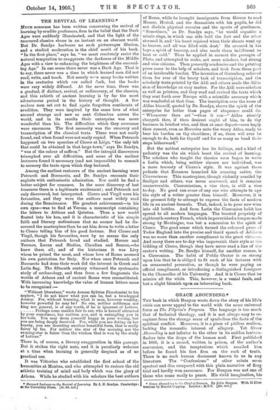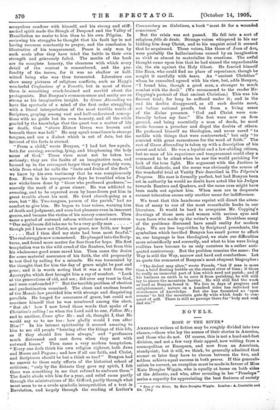THE book in which Bunyan wrote down the story of
his life's crisis can never appeal to the world with the same universal force as The Pilgrines Progress. The language is too much that of technical theology, and it is not always easy to re- capture from the strange maze of symbolism the facts of the spiritual conflict. Moreover, it is a piece of pitiless realism, lacking the romantic interest of allegory. Yet Grace Abounding is not inferior to the other in its sudden lantern- flashes into the deeps of the human soul. First published in 1666, it is a record, written in prison, of the author's conversion, and the temptations which assailed him before he found his feet firm on the rock of truth. There is no such human document known to us in any literature. The " Confessions " of other saints seem spectral and dim compared with this plain narrative of fiery trial and hardly won assurance. For Bunyan was not one of those who come easily to peace. His vivid. imagination, his * Grace Abounding to the Chief of Sinners. By John Bunyan. IVA 13 ghat trations by Harold Copping. London E.T.S. [Ms, net.]
Humiliation no easier to him than to his own Pilgrim. In reviewing his struggles he thought that his fault lay in not having recourse constantly to prayer, and the conclusion is illustrative of his temperament. Peace is only won by such souls after they have tried the battle in their own strength and grievously failed. The merits of the book are its complete honesty, the clearness with which every detail of the contest is remembered, and the pro- fundity of the issues, for it was no shallow or half- witted being who was thus tormented. Literature can
show many pictures of religious conflicts, such as Hogg's wonderful Confessions of a Fanatic, but in most of them there is something crack-brained and morbid about the protagonists. But Bunyan's common-sense and sanity are as strong as his imaginative insight. In Grace Abounding we have the spectacle of a mind of the first order struggling with a literal interpretation of the most terrible words of Scripture, groping among vast and half-understood concep- tions with no guide but its own honesty, and all the while goaded by the knowledge that the quest was a matter of life or death, that "above Elstow Green was heaven and beneath there was hell." He may speak sometimes in strange tongues, and use a dialect which is out of date, but the interest of the facts is eternal.
"From a child," wrote Bunyan, "I had but few equals, both for cursing, swearing, lying, and blaspheming the holy name of God." These vices must not be taken too seriously; they are the faults of an imaginative man, and loomed up in the retrospect larger than they probably were, while from what he calls the "lusts and fruits of the flesh" we know by his own testimony that he was conspicuously free. Even in his unregenerate days he trembled when he saw wickedness done by "those who professed goodness,"— scarcely the mark of a gross sinner. He was addicted to swearing, and to be reproved even by loose-livers put him in great trouble about his soul. He tried church-going as a cure, but "Mr. Two-tongues, parson of the parish," had no comfort to give him. He began to hear voices, warning him of death and judgment, and soon lost pleasure even in innocent games, and became the victim of his uneasy conscience. Then came a period of outward reform without inward conversion.
"Our neighbours did take me to be a very godly man • though yet I knew not Christ, nor grace, nor faith, nor hope.
Had I then died my state had been most fearful." The real struggle now commenced. He plunged into the Scrip- tures, and found more matter for fear than for hope. His first temptation was to the wild creed of the Ranters, but from this his wholesome good sense saved him. Then came the desire for some material assurance of his faith, the old propensity to test God by calling for a miracle. He was tormented by the thought that for him the day of grace might be past and gone; and it is worth noting that it was a text from the Apocrypha which first brought him a ray of comfort. "Look at the generations of old, and see ; did ever any trust in God, and were confounded P" But the terrible problem of election and predestination remained. The clean and unclean beasts of the Mosaic law provided him with strange and disquieting parallels. He longed for assurance of grace, but could not convince himself that he was numbered among the elect. "But oh ! how I now loved those words that spake of a Christian's calling ! as when the Lord said to one, Follow Me; and to another, Come after Me: and oh, thought I, that He would say so to me too : how gladly would I run after Him !" In his intense spirituality it seemed amazing to him to see old people "hunting after the things of this life, as if they should live here always," and "professors much distressed and cast down when they met with outward losses." Then came a very modern temptation. "Every one doth think his own religion rightest, both Jews and Moors and Pagans ; and how if all our faith, and Christ, and Scriptures should be but a think so too ? " Bunyan had no answer to these early efforts of the historical school of criticism; "only by the distaste they gave my spirit, I felt there was something in me that refused to embrace them." The doubt abode with him for a year, and relief came partly through the ministrations of Mr. Gifford, partly through what must seem to us a crude symbolic interpretation of a text in • o' ti Risen
Revelation, and largely through the reading of Luther's co. Las.]
But the crisis was not passed. He fell into a sort of religious foils ifs doute. Strange voices whispered in his ear bidding him deny Christ, and to his unquiet mind it seemed
that he acquiesced. These voices, like those of Joan of Arc, were probably the hallucinations caused by an imagination so vivid as almost to materialise its creations. The awful thought came upon him that he had sinned the unpardonable sin, the sin against the Holy Ghost. He fancied himself like Esau, who could find no place of repentance, though he sought it carefully with tears. An "ancient Christian' whom he consulted agreed with his view, but, adds Bunyan, "I found him, though a good man, a stranger to much combat with the devil." (We recommend to the reader Mr- Copping's portrait of that ancient Christian.) This was his fiercest trial ; for long he suffered under it; and in the end his doubts disappeared, as all such doubts must, not before rational proofs, but from a living sense of the divine presence. "God and Christ were con- tinually before my face." His feet were now on firm ground, and being essentially a man of deeds, he must needs become a preacher and dispel the doubts of others.
He professed himself no theologian, and never cared "to meddle with things that were controverted," but only "to contend with great earnestness for the word of faith." The rest of Grace Abounding is taken up with a description of his
arrest and trial. He was a loyalist and a law-abiding citizen, but no man of his experience and temperament could obey a command to be silent when he saw the world perishing for lack of the true light. His argument with the Justices is brilliant dialectic, and the scene was obviously the source of
the wonderful trial at Vanity Fair described in The Pilgrim's Progress. His case is formally perfect, but had Bunyan been
set in authority he would no doubt have acted like his Judges towards Ranters and Quakers, and the same case might have been made out against him. When men are in desperate earnest toleration seems only another name for indifference.
We trust that this handsome reprint will direct the atten- tion of many to one of the most remarkable books in our literature. It would be hard to overpraise Mr. Copping's drawings of those men and women with serious eyes and worn faces who made up the writer's world. Doubtless many of the problems discussed have small reality for modern days. We are less hag-ridden by Scriptural precedents, the symbolism which terrified Banyan has small power to affect us, our language is less theological, we state our difficulties more scientifically and correctly, and what to him were living realities have become to us only counters in a rather anti- quated controversy. But the problem remains the same: the Way is still the Way, narrow and hard and comfortless. Let us quote the comment of Bunyan's most eloquent biographer:
"The dialect may alter," wrote Fronde, "bat if man is more than a brief floating bubble on the eternal river of time; if there be really an immortal part of him which need not perish ; and if his business on earth is to save it from perishing, he will still try to pierce the mountain barrier. He will still find the work as bard as Bunyan found it. We live in days of progress and enlightenment; nature on a hundred sides has unlocked her storehouses of knowledge. But she has furnished no open sesame' to bid the mountain gate fly wide which leads to con- quest of self. There is still no passage there for body and soul and sin."
NOVELS.















































 Previous page
Previous page